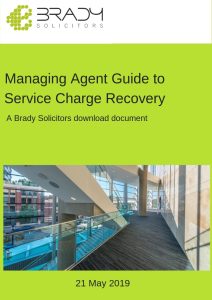With 2016 safely behind us, it’s time to start the New Year with a clean slate. This means keeping service charge collection under control and not letting arrears build up. Brady Solicitors’ service charge expert Sumi Begum, provides a helping hand…
Service charge arrears can build up quickly and before you know it, cash flow starts to become a problem and property management suffers. To help minimise arrears, it can be useful to understand why leaseholders may not be paying so that you can take action.
Sumi reminds us of the top reasons for non-payment of service charges and suggests ways of overcoming the problems:
Unhappy with quality of work undertaken
Often at the forefront of a leaseholder failing to pay their service charge arrears is a dispute relating to the quality of work undertaken by their landlord to the development. Many leaseholders believe that the landlord is not fulfilling their obligations according to the terms and conditions of the lease, and as such use this as a reason for non-payment.
Concerns with level of work undertaken
By contrast, a frequent reason for withholding payment can also be leaseholders querying ‘unnecessary works’ being undertaken to the development. We regularly hear concerns about improvement works being carried out by the landlord for which the leaseholders feel they should not be charged nor held liable as they are not necessary.
Delays in works undertaken
A delay in repair works being carried out to a development can exacerbate the disrepair of the property, which can then ultimately require leaseholders to contribute more towards the repair and maintenance. A common example would be roof repair works, and landlords leaving the repair and maintenance to the 11th hour.
Service charge demand not compliant
A leaseholder who is not served with a compliant service charge demand(s) in accordance with section 47 and 48 of the Landlord and Tenant Act 1987 can withhold payment of his service charge until such time as he has received a compliant demand. The demand must be accompanied with the summaries of the tenants’ rights and obligations. This is one of the most common reasons for leaseholders withholding payment of their service charge. (Visit our resources page for links to the rights and obligations wordings.)
Service charge apportionment not in accordance with the lease
Some leases may expressly state a leaseholder’s percentage contribution to their service charge. In the event that the leaseholder is charged more than the percentage stipulated, they have a valid reason to dispute the service charge arrears payable and withhold payment.
Service charge not demanded in accordance with the lease
Another common reason for withholding payment is where the demands are not made in accordance with the lease. The lease will state when service charges are to be demanded, i.e. in advance or in arrears, and how often e.g. quarterly or half yearly. Leaseholders commonly argue that payment of their service charges is not yet due because the demands do not follow the periods set out in the lease.
Demand not received
The reason for non-payment could be as simple as the service charge demand not being received by the leaseholder.
Sometimes the leaseholder who owns the flat may not be living in it, instead subletting the premises to tenants. In such cases it is the responsibility of the leaseholder to provide an alternative address for correspondence if he does not wish to receive post at the property address. Where an alternative address has not been provided, a leaseholder cannot argue that he has not been served with a demand. However, very often, we find that an alternative address has been given, but the demand has still been sent to the property address. This can be avoided with better record keeping.
Can’t afford to pay
It may be that the leaseholder is genuinely unable to pay the service charges due to lack of funds. This may arise following an unexpected major works project or be due to changes in a leaseholders’ financial circumstances. In such cases, a payment plan might be offered.
How to minimise non-payment of service charge arrears
Ultimately, we find that these issues arise due to a lack of transparency, accountability and, in some instances, communication between the landlord and the leaseholder when it comes to the repair and management of the block.
Here are a few easy-to-adopt pointers for avoiding these non-payment situations:
- Ensure you fully understand your leases and make sure you correctly issue service charge demands in accordance with the terms of the lease.
- Maintain open communication with leaseholders to avoid surprise expenditure and keep accurate records of how contractors are chosen, expenditure levels and so forth.
- Ensure your service charge demands are compliant – insert link to another blog
- Always ensure you update your records when a leaseholder has provided a change of correspondence address. If in doubt, send the demand to all addresses held on file for the leaseholder.
- For leaseholders who are struggling to make the payment, consider offering a staged or interim payment facility.
Need help getting your demands in check?
Contact the service charge team at Brady Solicitors – we can review your service charge demands to check they are compliant and help you to prevent your service charge arrears building up later in the year.


